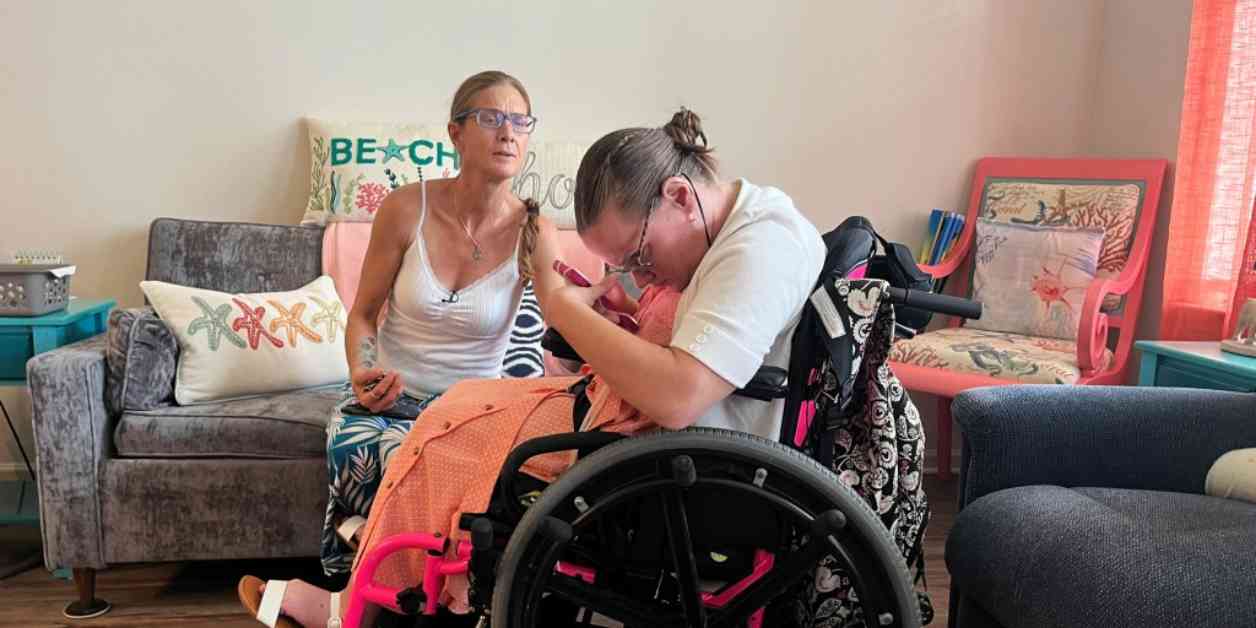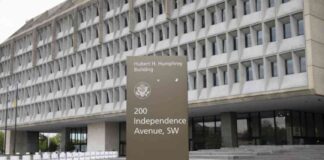Lauren Eakin, a 34-year-old woman from Jacksonville, Florida, is legally blind and confined to a wheelchair due to cerebral palsy. For years, she has relied on caregivers paid for through Medicaid to assist her with daily tasks, allowing her to live relatively independently in her own apartment. However, this summer, Eakin faced a devastating setback when the state of Florida revoked her essential Medicaid coverage, leaving her in a state of panic and uncertainty.
Eakin expressed her need for constant assistance in various aspects of her life, from getting up and eating to preparing meals and going out into the community. Her caregivers also supported her in participating in advocacy work and playing on a local baseball team, activities that brought a sense of normalcy and fulfillment to her life. However, all of this came to a halt when her Medicaid coverage lapsed in June, unbeknownst to her until her caregivers stopped receiving payments, forcing them to reduce their hours significantly.
The sudden loss of Medicaid coverage left Eakin alone overnight for over a month, unable to perform basic tasks like using the bathroom or leaving her apartment in case of an emergency. She described the experience as one of pure panic, as she struggled to understand what had happened and how she would navigate through this difficult situation. Eakin’s story is just one of many in Florida and across the country where individuals with disabilities have faced challenges in restoring their Medicaid coverage.
**Challenges Faced by Disabled Floridians in Restoring Medicaid**
The unwinding of Medicaid coverage in Florida has had a profound impact on individuals with disabilities, leaving many vulnerable and without essential support. More than 25 million people in the U.S. have lost their Medicaid coverage during this process, with procedural issues cited as a common reason for disenrollment. For individuals like Eakin and others with developmental disabilities, completing the renewal process can be particularly challenging, often requiring additional assistance that may not be readily available.
Melissa Mazaeda, vice president of J&M Support Coordination, highlighted the difficulties faced by individuals with developmental disabilities in navigating the Medicaid renewal process. She emphasized that these individuals require lifelong services and support, making Medicaid a crucial lifeline for their well-being. Unfortunately, many were dropped from the program without adequate notice or assistance, leading to a state of uncertainty and distress.
Advocates for the disabled have raised concerns about the mishandling of Medicaid disenrollments in Florida, with allegations of unconstitutional practices and violations of individuals’ rights. The lack of proper communication and support during the unwinding process has left thousands of disabled Floridians without the essential care they need to lead fulfilling lives. The National Health Law Program and other organizations have taken legal action to address these injustices and ensure that individuals with disabilities are not unfairly stripped of their Medicaid coverage.
**Legal Action and Advocacy Efforts**
In response to the widespread disenrollments and lapses in Medicaid coverage, legal action has been taken against the state of Florida for its handling of the unwinding process. A class action lawsuit has been filed, accusing the state of illegal practices and violations of individuals’ constitutional rights. The lawsuit alleges that tens of thousands of Floridians were dropped from Medicaid without proper notice or explanation, leaving them without access to vital healthcare services.
The National Health Law Program and other advocacy groups have been vocal in their condemnation of the state’s actions, calling for accountability and justice for those affected by the Medicaid disenrollments. Civil rights complaints have been filed in several states, including Florida, to address the discrimination faced by people with disabilities in accessing and maintaining their Medicaid coverage. These efforts aim to ensure that individuals with disabilities are not unfairly targeted or excluded from essential healthcare services.
**Impact on Individuals with Disabilities**
The impact of losing Medicaid coverage goes beyond just the financial implications for individuals with disabilities. It can have profound effects on their physical, emotional, and mental well-being, as they struggle to cope with the sudden loss of essential support services. Stories like that of Lauren Eakin and others highlight the real-life consequences of bureaucratic errors and mishandling of Medicaid disenrollment processes.
Paul, a 57-year-old man from Dunedin, Florida, who has an intellectual disability, a pacemaker, and a seizure disorder, shared his experience of having his Medicaid coverage dropped in March. Despite receiving a renewal notice in November, Paul’s coverage was suddenly terminated, leaving him without access to the care and support he relied on. The lack of communication and transparency from the state added to his stress and anxiety, culminating in a panic attack that required emergency medical attention.
The emotional toll of losing Medicaid coverage is significant for individuals like Paul and Eakin, who face uncertainty and fear about their future without essential healthcare services. The struggle to navigate complex bureaucracies and advocate for their rights adds an additional layer of stress to their already challenging lives. The need for systemic change and accountability in the Medicaid system is urgent, as more disabled individuals continue to be disenrolled without proper notification or recourse.
**Efforts to Restore Medicaid Coverage**
Despite the challenges faced by disabled Floridians in restoring their Medicaid coverage, there have been efforts to address the systemic issues that have led to widespread disenrollments. Advocates and legal organizations have been working tirelessly to hold the state accountable for its actions and ensure that individuals with disabilities are not unfairly targeted or excluded from vital healthcare services.
The reinstatement of Lauren Eakin’s Medicaid coverage is a small victory in a larger battle for justice and equality for disabled individuals in Florida. However, the fight is far from over, as thousands of disabled Floridians continue to struggle with the repercussions of losing their Medicaid coverage. The need for transparency, accountability, and compassionate care for individuals with disabilities is paramount in addressing the systemic failures that have led to this crisis.
In conclusion, the struggles faced by disabled Floridians in restoring their Medicaid coverage highlight the urgent need for reform and advocacy in the healthcare system. The stories of individuals like Lauren Eakin and Paul shed light on the human consequences of bureaucratic errors and systemic failures that have left vulnerable populations without essential support. It is essential that we continue to fight for the rights and dignity of individuals with disabilities, ensuring that they have access to the care and services they need to live full and fulfilling lives.

















